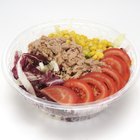
clemarca/iStock/Getty Images
Comprised of fish, rice and vegetables wrapped in seaweed, the spicy tuna hand roll sounds like a healthy sushi option. But unlike the simple tuna or salmon roll, spicy tuna rolls have added calories and fat from mayonnaise.
Count Your Calories
The calories in a spicy tuna hand roll vary depending on who makes them, and range from 117 to 182 calories per roll. If you follow a 2,000-calorie diet, one hand roll meets 6 to 9 percent of your daily calorie needs. Most Americans eat too many calories, according to the Dietary Guidelines for Americans 2010.
Carbs and Protein
The tuna, rice and vegetables contribute to the carb and protein content of the spicy tuna hand roll. One hand roll contains 9 to 18 grams of carbs, 1 to 2 grams of fiber and 6 to 15 grams of protein. The carbs provide your body with energy, while the protein helps repair body tissue and preserve lean body mass. Fiber is a type of carbohydrate your body cannot digest, and getting more in your diet alleviates constipation and may reduce your risk of heart disease. Up the fiber in your hand roll by replacing the white rice with brown rice.
Let's Talk About the Fat
The spicy tuna hand roll may be higher in fat than other types of sushi because of the added mayonnaise. One spicy tuna hand roll contains 2 to 9 grams of total fat, up to 1 gram of saturated fat and 2 to 26 milligrams of cholesterol. While most of the fat and cholesterol comes from the mayonnaise, the tuna in the hand roll is rich in omega-3 fats, essential fats that helps lower inflammation and may reduce your risk of heart disease and cancer.
Watch the Sodium
High intakes of sodium are associated with high blood pressure, says the Dietary Guidelines for Americans 2010, making it important that you pay close attention to your daily intake. The amount of sodium in one spicy tuna hand roll ranges from 97 to 320 milligrams. You should limit the amount of sodium in your diet to less than 2,300 milligrams a day, or less than 1,500 milligrams if you are over the age of 51, of African American descent or already have high blood pressure.
Related Articles

Shrimp Avocado Roll Calories

What Is Hand Salve?
Calories in a Cucumber and Avocado Roll

Calories in Bread Rolls

Calories of Tuna in Sunflower Oil

How to Cook Rolled Stuffed Salmon ...

Is Eating Tuna in the Can Every Day ...

How to Freeze Tuna Salad

Spicy Shrimp Roll Calories

How to Cook Tuna on a Stove

Nutrition in a Fried Pork Egg Roll

How to Make Crunchy & Spicy Tuna Rolls

How to Adjust a Pulsar Watch Band

How to Roll a Bandana

Calories in Cooked Wheat Pasta

Calories in a Cheese Roll

How to Tie a Bandana Around Your Wrist

Fish & Pasta Meals

How Do I Cook a Tuna Steak Without ...

Calories in a Subway Cheese Pizza
References
- PBS.org: Spicy Tuna Hand Roll Recipe
- iLivestrong.com: MyPlate: Spicy Tuna Hand Roll Nutritional Facts
- Bon Appetit: Spicy Seattle Tuna Rolls
- U.S. Department of Agriculture & U.S. Department of Health and Human Services: Dietary Guidelines for Americans, 2010
- U.S. Department of Agriculture: National Nutrient Database for Standard Reference: Salad Dressing, Mayonnaise, Regular
- Hawaii Seafood: Yellowfin Tuna
- University of Maryland Medical Center: Omega-3 Fatty Acids
Writer Bio
Jill Corleone is a registered dietitian and health coach who has been writing and sharing her love of food, nutrition and health with anyone who'll listen for almost 20 years. Her work has been featured on the Huffington Post, Diabetes Self-Management and Working Mother.
Photo Credits
clemarca/iStock/Getty Images